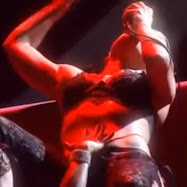promised you there should be austerity and self-denial in the matter of
letter-writing: and I know you are unselfish enough to expect even less
than I send you.
Girls in the street address compliments to Arthur's complexion:
"beautiful brown boy" they call him: and he simmers over with vanity, and
wishes he could show them his boating arms, brown up to the shoulder, as
well. Have you noticed that combination in some of the dearest specimens
of young English manhood, great physical vanity and great mental modesty?
and each as transparently sincere as the other.
The Bargello is an ideal museum for the storage of the best things out of
the Middle Ages. It opens out of splendid courtyards and staircases, and
ranges through rooms which have quite a feudal gloom about them; most of
these are hung with bad late tapestries (too late at least for my taste),
so that the gloom is welcome and charming, making even "Gobelins" quite
bearable. I find quite a new man here to admire Pollaiolo, both painter
and sculptor, one of the school of "passionate anatomists," as I call
them, about the time of Botticelli, I fancy. He has one bust of a young
Florentine which equals Verocchio on the same ground, and charms me even
more. Some of his subjects are done twice over, in paint and bronze: but
he is more really a sculptor, I think, and merely paints his piece into a
picture from its best point of view.
Verocchio's idea of David is charming: he is a saucy fellow who has gone
in for it for the fun of the thing knew he could bring down a hawk with
his catapult, and therefore why not a Goliath also? If he failed, he
need but cut and run, and everybody would laugh and call him plucky for
doing even that much. So he does it, brings down his big game by good
luck, and stands posing with a sort of irresistible stateliness to suit
the result. He has a laugh something like "little Dick's," only more
full of bubbles, and is saying to himself, "What a hero they all think
me!" He is the merriest of sly-dog hypocrites, and has thin, wiry arms
and a craney neck. He is a bit like Tom Sawyer in character, more ornate
and dramatic than Huckleberry Finn, but quite as much a liar, given a
good cause.
Another thing that has seized me, more for its idea than actual carrying
out, is an unnamed terra-cotta Madonna and Child. He is crushing himself
up against her neck, open-mouthed and terrified, and she spreading long
fingers all over his head and face. My notion of it is that it is the
Godhead taking his first look at life from the human point of view; and
he realizes himself "caught in his own trap," discovering it to be ever
so much worse than it had seemed from an outside view. It is a fine
modern zeit-geist piece of declamation to come out of the rather
over-sweet della Robbia period of art.
There seems to have been a rage at one period for commissioning statues
of David: so Donatello and others just turned to and did what they liked
most in the way of budding youth, stuck a Goliath's head at its feet,
and called it "David." Verocchio is the exception.
We are going to get outside Florence for a week or ten days; it is too
hot to be borne at night after a day of tiring activity. So we go to the
D s' villa, which they offered us in their absence; it lies about
four miles out, and is on much higher ground: address only your very
immediately next letter there, or it may miss me.
There are hills out there with vineyards among them which draw me into
wishing to be away from towns altogether. Much as I love what is to be
found in this one, I think Heaven meant me to be "truly rural"; which
all falls in, dearest, with what I mean to be! Beloved, how little I
sometimes can say to you! Sometimes my heart can put only silence into
the end of a letter; and with that I let this one go. Yours, and so
lovingly.
continued below....





















